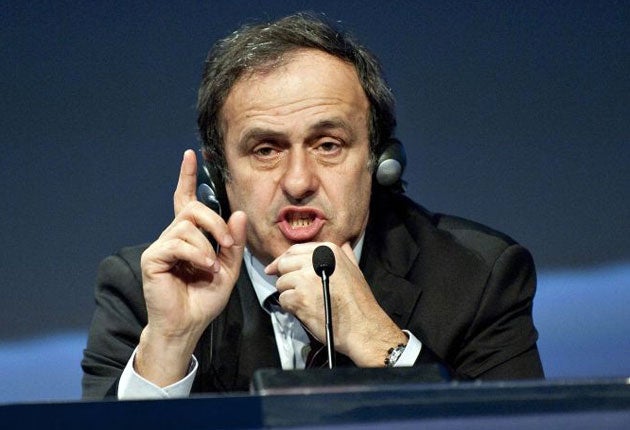James Lawton: Chelsea and Arsenal may not agree but game needs harsh punishments
We can easily recognise the fingerprints of Uefa president Platini on the move by Fifa

What on earth is happening to football? Could it really be in danger of being properly governed?
Maybe we shouldn't get too excited, too quickly, but if this amazing proposition is proved to have substance the first week of September 2009 will surely need to be marked down as one of rare significance in the history of the world's most popular game.
First, Uefa, Europe's governing body, announced the two-game ban for Arsenal's Eduardo da Silva after finding him guilty of diving to deceive a referee – and at one stunning stroke finally accepted its responsibility in the face of a form of cheating that for so long has horribly cheapened football at every level.
By the middle of yesterday afternoon, though, a decision which rode through a wall of hysterical and almost entirely illogical opposition from within and outside the game was looking like a mere canapé in a potential banquet of major reform and tighter regulation.
The ruling of Fifa – the game's supreme authority – that Chelsea will not be able to move in the transfer market until the window of January 2011 is certainly a massive suggestion that the hint of steel in the Eduardo decision might be turning into a genuinely iron fist.
No doubt Chelsea will argue as fiercely against the ruling that they induced the brilliant French prospect Gaël Kakuta to break his contract with his club Lens – to whom he had been attached since the age of eight – while he was still under 16, as Arsenal did the banning of Eduardo.
The Swiss club FC Sion are already travelling the appeal route with the Court of Arbitration for Sport after receiving a similar suspension when Fifa found them guilty of poaching an Egyptian goalkeeper.
However, Lens were yesterday claiming that the case against Chelsea was an unbreakable one and that the financial penalties of around £750,000 imposed on the London club along with the transfer ban and a four-month suspension for Kakuta were, far from being "over the top", an inevitable consequence of a blatant act of talent theft.
The transfer ban, if upheld, is certainly a devastating blow to the strategic hopes of Chelsea's new manager Carlo Ancelotti. No doubt the former Milan coach is delighted with the early going of his new team, but he knows that it is a long season and that Chelsea are not only an ageing team but one which, for all their wealth and the employment of the much trumpeted guru of high-class recruitment Frank Arnesen, has signally failed to develop for itself a stream of sure-fire young contenders.
The fact that the outstanding Kakuta has come at such a potentially devastating cost – a complete suspension of team-strengthening as rivals Manchester United, Liverpool, Arsenal and the new rich boys on the block, Manchester City, have the chance of getting two major infusions of talent over the next year – is a development of savage irony.
For so long it was presumed that the oligarch Roman Abramovich would invest vast sums in support of a favoured coach. Jose Mourinho ran out of that favour and his successors Avram Grant and Luiz Felipe Scolari never won it. Now Ancelotti's chances of enjoying a vastly stronger hand in the market after his impressive initial impact have been smashed in one thunderous message from Fifa's headquarters in Switzerland.
But if it is a crushing strike against Chelsea's ambitions of regaining a momentum that dwindled with Mourinho's decline at Stamford Bridge, it can also be seen as a significant move towards cleaning up a market in youth players that has been increasingly shaped by the ruthless behaviour of the most powerful clubs.
Nor is forensic investigation required in recognising the fingerprints of the Uefa president, Michel Platini, on the move of the senior organisation to throw such a huge caution against a continuation of the more unscrupulous recruitment.
Earlier this year a Uefa meeting presided over by Platini agreed the principle that there should be a ban on the international transfer of players under the age of 18. Yesterday's move suggests strongly that the principle will enter the statutes of the international game. Platini said: "The question of minors is above all a moral, ethical issue. We have a duty to take concrete steps to protect young players and training clubs."
It has been widely claimed in England that Platini is driven by some fanatic obsession with the rise of the Premier League's power and wealth, and that it is a factor which colours so much of his agenda. Yet when you examine the issues he has put at the forefront of his presidency – the need for rationalisation of club spending, serious action against cheating and safeguards against the exploitation of young players and the clubs who have nurtured them – it is hard not to believe his motivation seems to warrant somewhat less concern than those of his heaviest critics.
Chelsea and to a much lesser extent their rivals Arsenal have been inconvenienced this week, the former to the point where the whole basis of their wealth-fuelled operation has been undermined.
Yet in the light of the shameful abdication of the rugby authorities when Harlequins were allowed to continue in a tournament in which they had debased the name of sport, there is impressive evidence that football is offering some clear hints of good governance. Indeed, there are some grounds to believe it might just be growing up.
Subscribe to Independent Premium to bookmark this article
Want to bookmark your favourite articles and stories to read or reference later? Start your Independent Premium subscription today.

Join our commenting forum
Join thought-provoking conversations, follow other Independent readers and see their replies